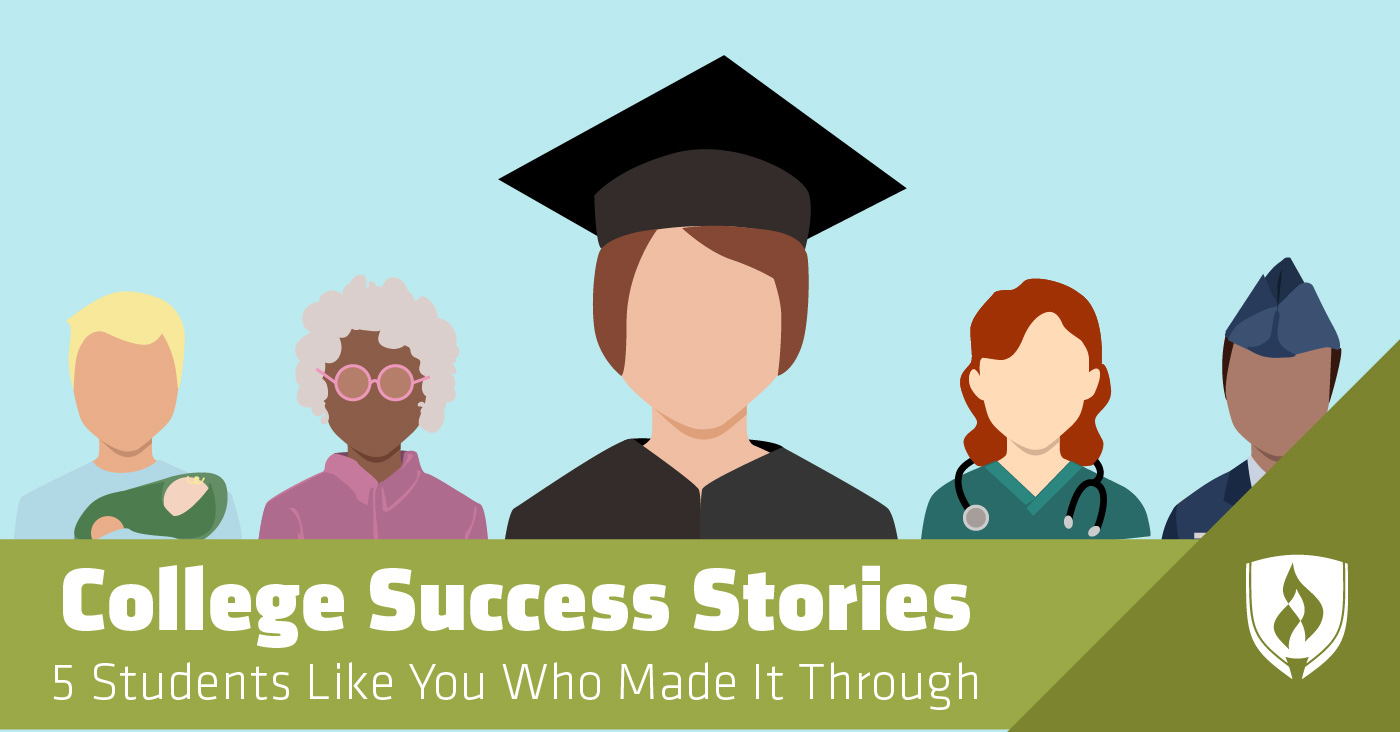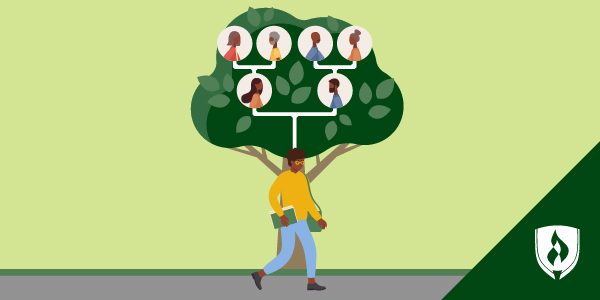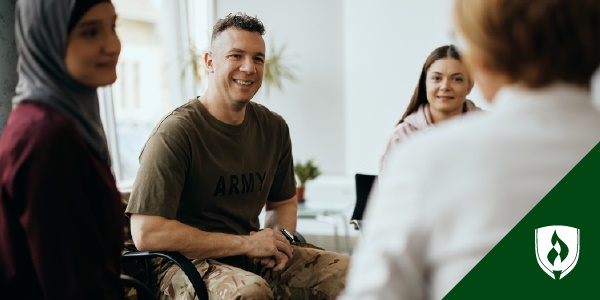
Going back to school is a big decision. You're aware of the benefits of earning a degree, but you're hesitant about the road to graduation. How will you squeeze classes, assignments and studying into your already busy life? Do you have what it takes to succeed in the classroom?
It's normal to be apprehensive. But don't let your doubts stand in between you and your dreams. We connected with five successful Rasmussen College students from various backgrounds to show that success comes in many shapes and sizes. See how they overcame their obstacles to earn their degrees. If they can do it, so can you!
5 college success stories to inspire you
The young parent...
Navigating college life while fresh out of high school can be a challenge, especially at a large university. When you add the responsibilities of being a parent to that challenge, it is easy to see how some might struggle. ; Nursing student Krystl Taylor learned all about that experience when she first enrolled in college.
“I was one of the few students married with kids,” Taylor says. “I felt kind of alone because there weren’t a lot of students that could relate to my life.” ;
Taylor eventually left the larger state school for Rasmussen College, where the flexibility of online classes eased the logistical issues that come with raising a family and attending school.
The staff has also gone above and beyond to provide her with the one-on-one support that was lacking at her previous school—one instructor even provided her with a walk through of a subject late on a Saturday night. Taylor graduated in 2014, thanks in part to that support. The significance in graduating isn’t just the degree, but the example she has set for her children.
“I want my kids to know the importance of getting an education and chasing their dreams and goals,” Taylor says.
The non-traditional student...
It had been a long time since nursing graduate Dana Hainer stepped foot in a college classroom. Years ago, she began the process of entering nursing school but those plans took a back seat when she received a call saying that she and her husband could adopt their oldest son.
Hainer pulled out of nursing school in order to care for her son, who has multiple medical conditions such as autism and bi-polar disorder. Time passed and circumstances changed—her son is an adult now and her marriage ended. Because of this, Hainer needed to quickly get back to work and, consequently, back to school.
Hainer wasn’t completely comfortable with going to a large school full of students from a younger generation, and definitely didn’t have time for the waiting lists she found for those schools’ nursing programs. At Rasmussen College Hainer was able get straight into the nursing program and also receive the one-on-one attention she needed as a non-traditional student. That support was particularly helpful when navigating the advances in technology that have come since her last classroom experience.
“Learning new things like submitting assignments by email can be a stumbling block for people my age,” Hainer says. “The support staff was really helpful in walking me through things I didn’t know.”
That support has paid off—Hainer graduated in 2013 from the nursing program and says that the technological skills she developed after returning to school have made her life much easier.
The returning veteran...
Military veterans have a strong incentive to return to school in the benefits provided by the post-9/11 G.I. bill, but returning vets still have plenty of uncertainties to address. Criminal justice graduate Jake Johnson was no different after returning home from serving in the U.S. Air Force.
The rigid structure of the military made the freedom Johnson experienced after ending his service a little overwhelming initially. However, the discipline and work ethic he developed in the military made a positive impact on his academic career, after readjusting to giving his own orders. ; ;
“I was shocked with just how easy it was for me to sit down and do my work,” Johnson says. “I think a lot of that comes from the military getting me used to taking orders and carrying them out.”
Johnson graduated from Rasmussen College in 2012 with an associate degree, and is currently applying his military and academic training to his career as a police officer in Arkansas.
The career changer...
It takes a lot of courage to change careers, even if your career is becoming stagnant. The skills you’ve spent years developing in your current career may not be used in a different field, but sometimes the question of “what if?” becomes too much to resist. ;
Patrick Joyce, now a graduate of the Rasmussen College nursing program, spent years working in law enforcement with the inkling that his best fit may be as a nurse. In fact, a career aptitude test he took while studying to become a police officer said exactly that.
So shortly after early retirement from police work, Joyce jumped into nursing school. He did have reservations—switching back to academic life after a long time away took some adjustment. That switch, while requiring some effort, went smoothly and Joyce is now working as an RN after graduating in 2012. Joyce’s only regret? Not getting into nursing earlier.
“Hindsight being 20/20, I should have taken that [aptitude test] as a sign and got into nursing sooner,” Joyce says.
The working student...
Derek Clifton had a steady job as a quality assurance coach at a call center but found himself up against a career ceiling. He knew he wanted to work in a human resources role at his company but his educational background wasn’t a fit.
Clifton knew he had to get back to school to advance his career, but didn’t want to drop everything and leave his job to get his degree. He also had reservations about being able to balance both school and work responsibilities.
“I was a little afraid at first to go back to school,” said Clifton. “But it was just a matter of me taking that step and holding myself accountable.”
Clifton’s concerns were alleviated by the flexibility his online coursework provided, as he could plan out his week in advance and prepare accordingly. That planning worked; Clifton earned his bachelor’s degree in 2013 with a 3.9 GPA and is now equipped to take the next step in his career.
What’s stopping you?
These students all had roadblocks on their paths to earning a degree, but they stuck with it and now are on the road to future success. If you're ready to kick your excuses to the curb and follow in their footsteps, consider taking the first step of your education journey. ;
Check out our article to see if you're ready to take the leap: ;6 Signs You're Ready to be a College Student.
RELATED ARTICLES:




